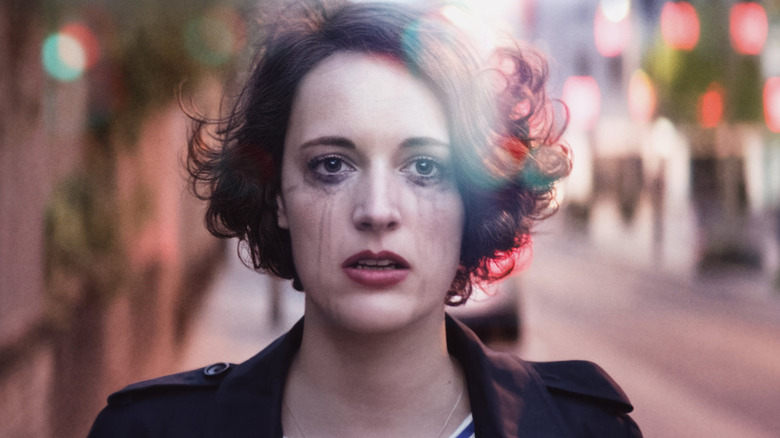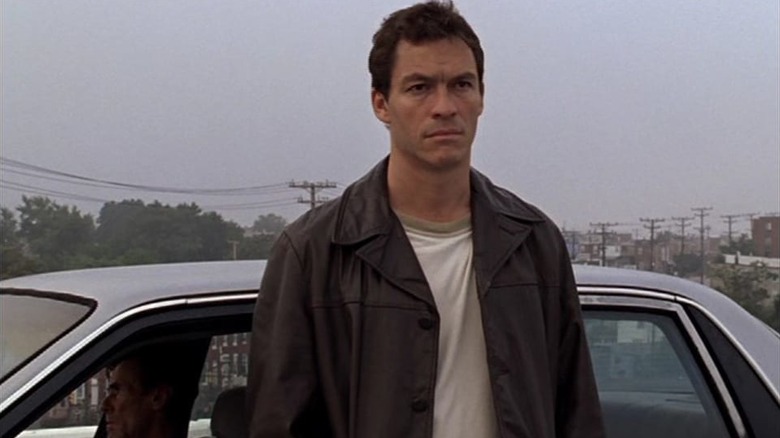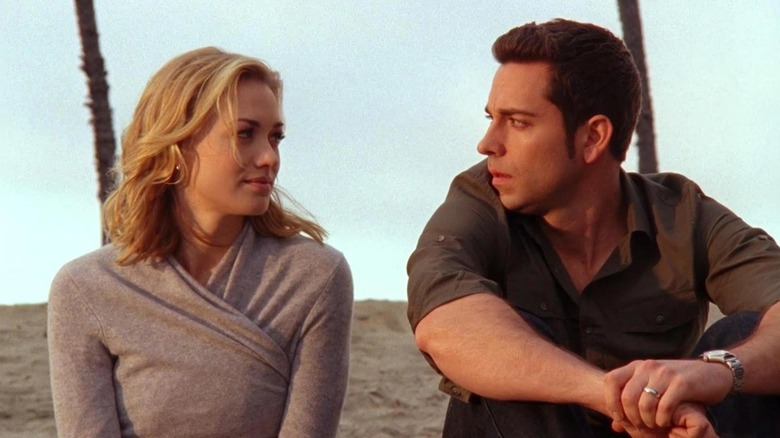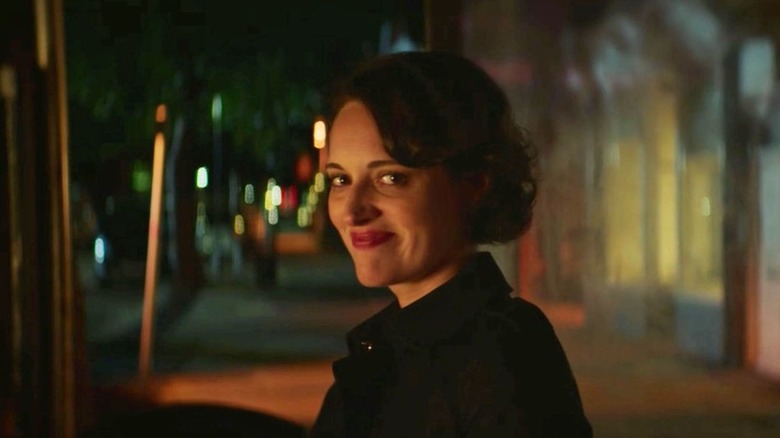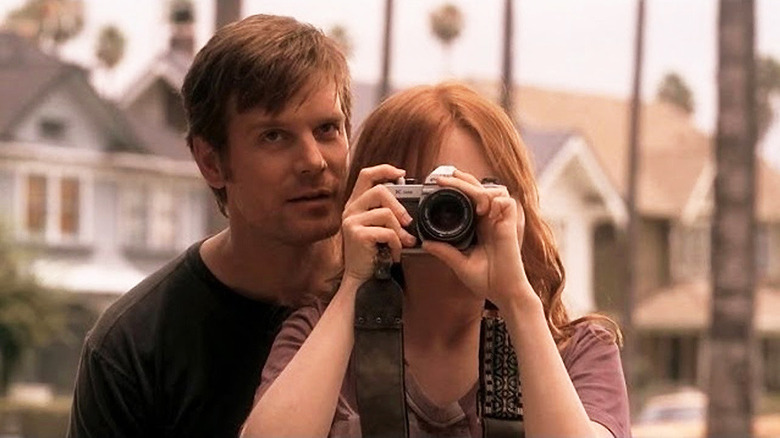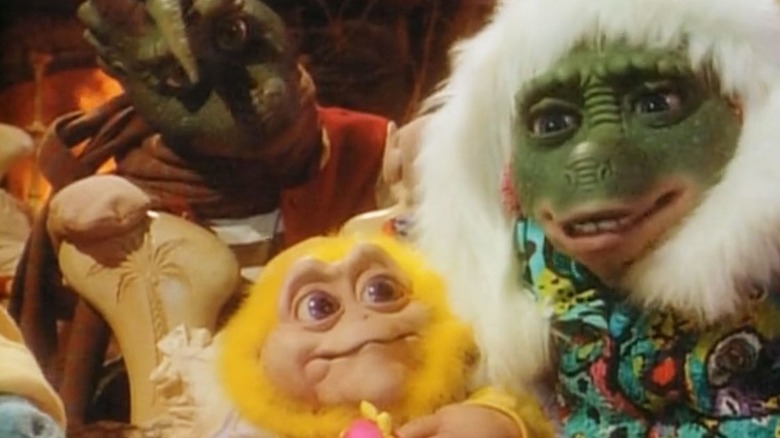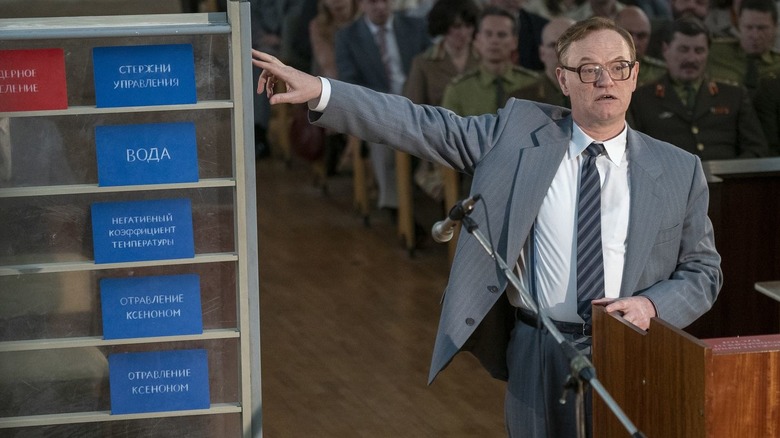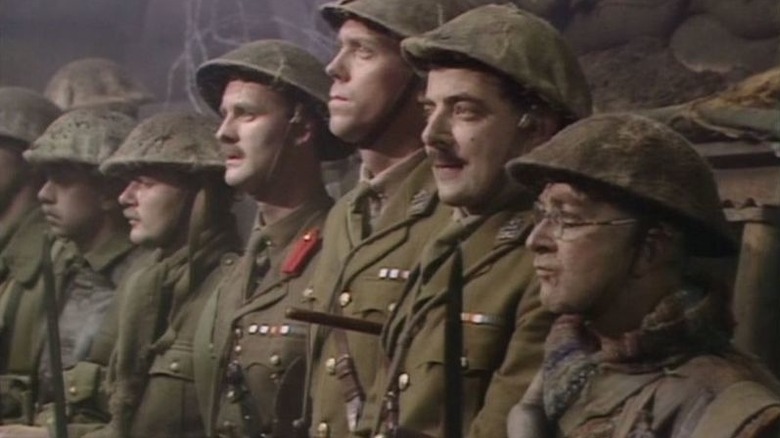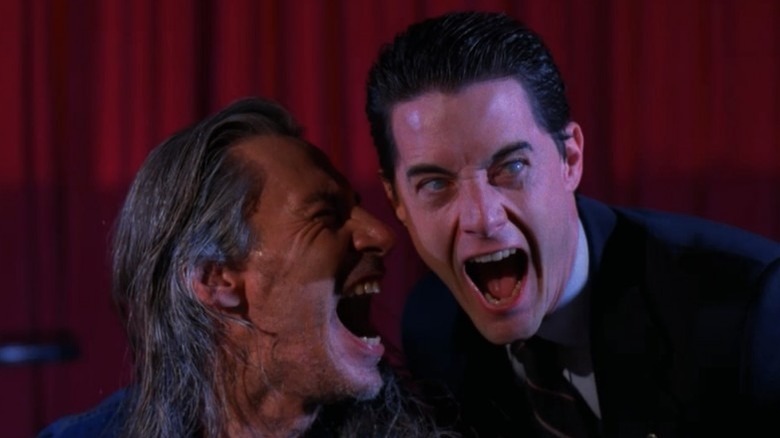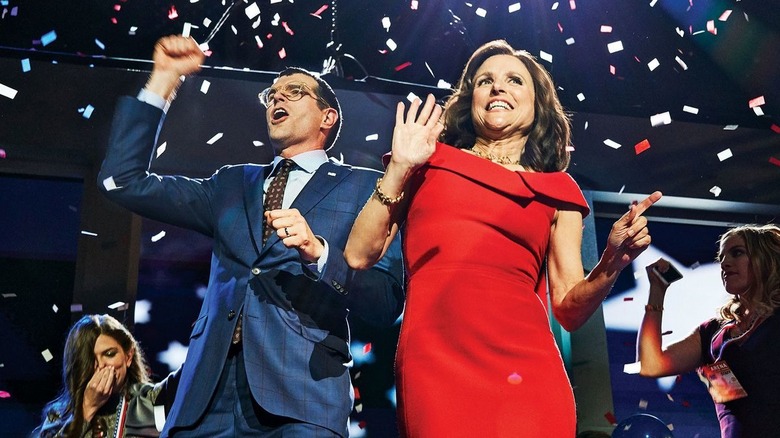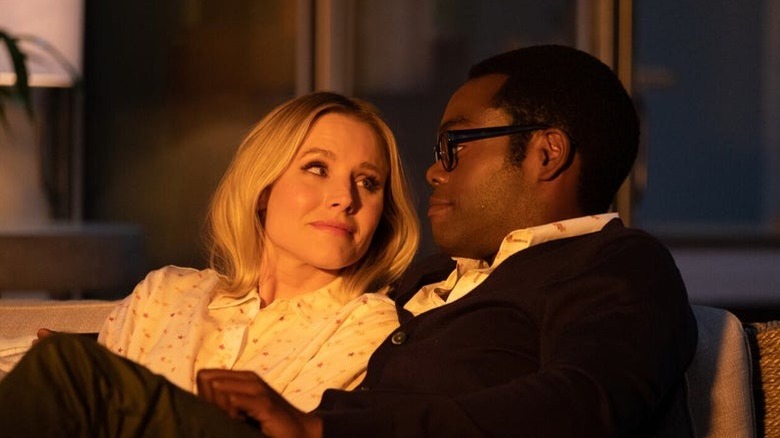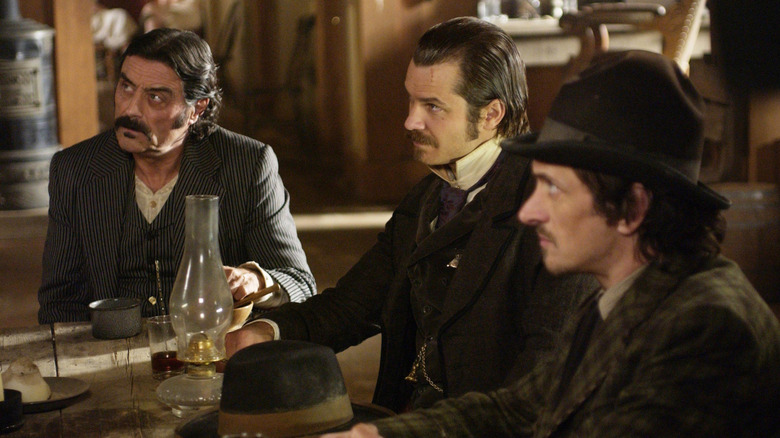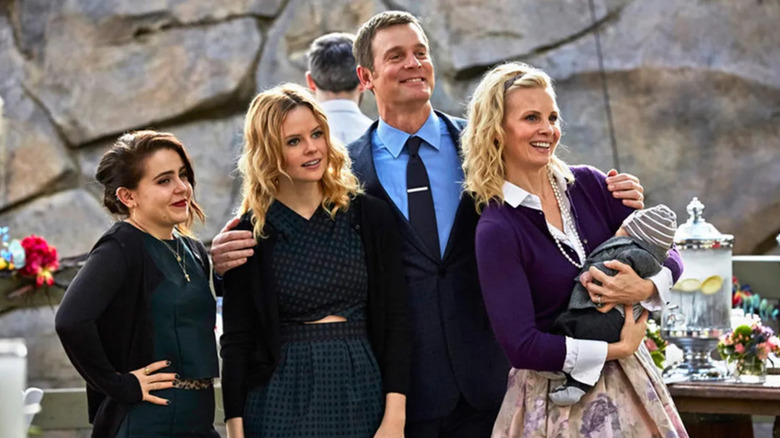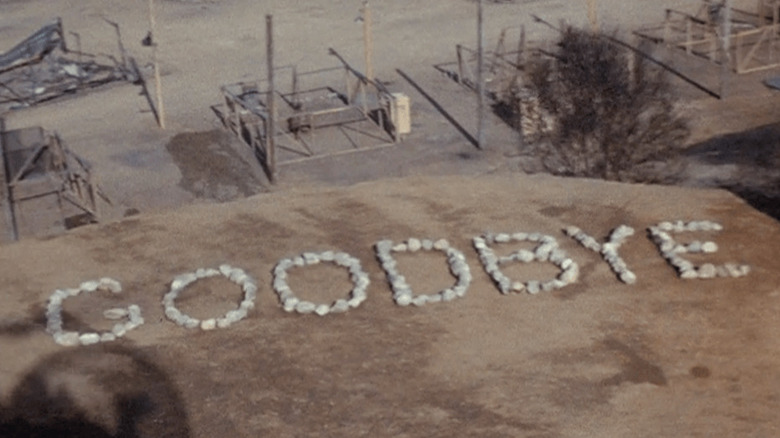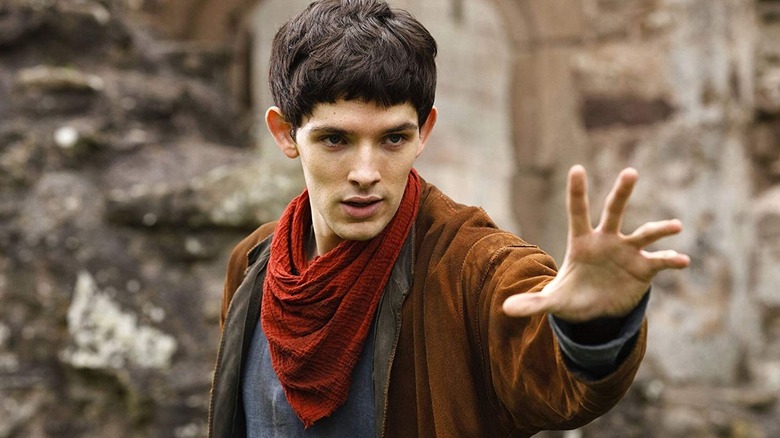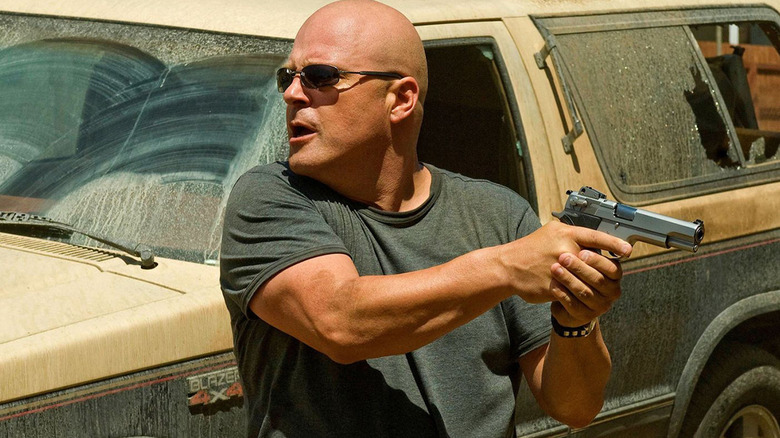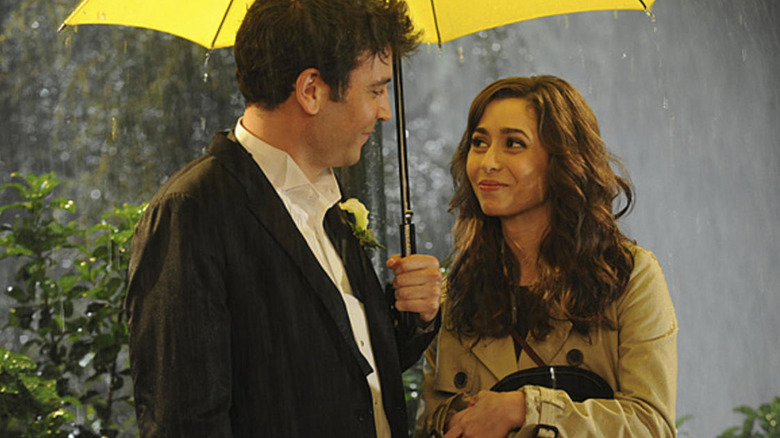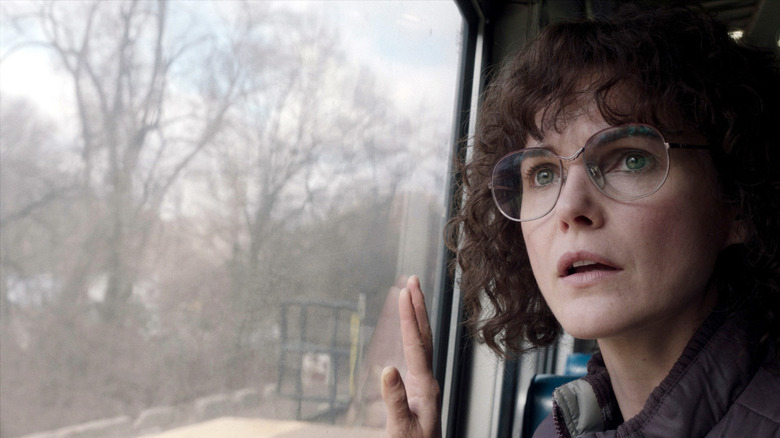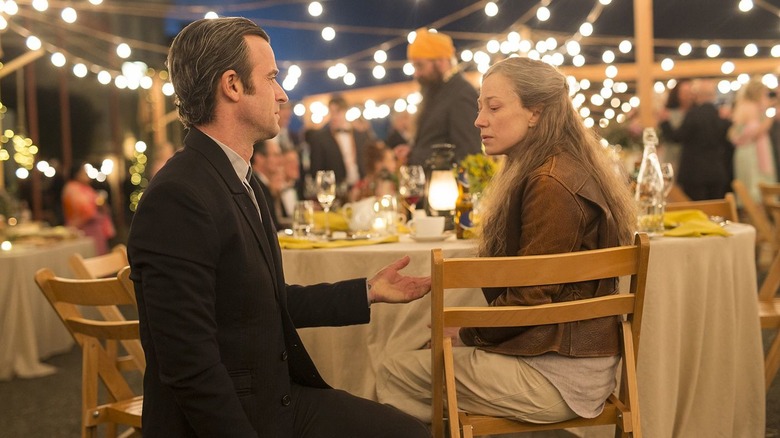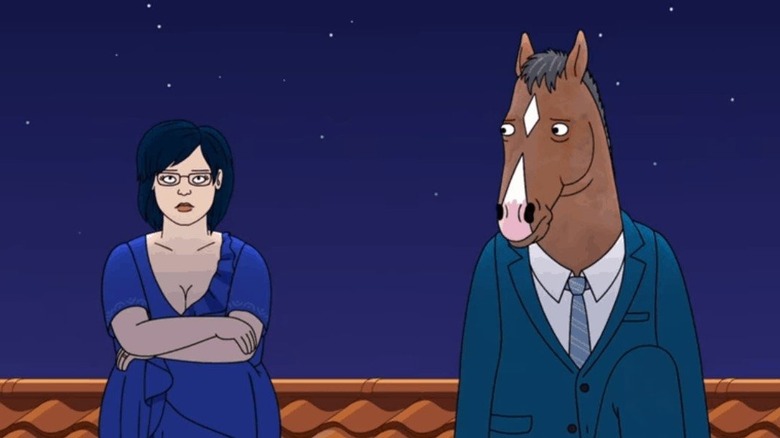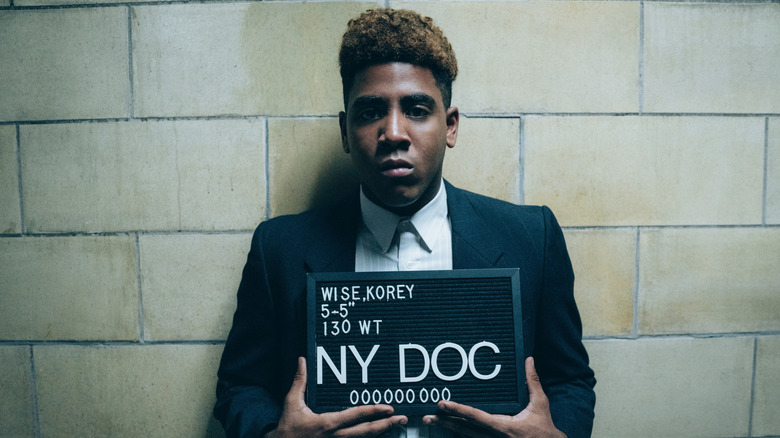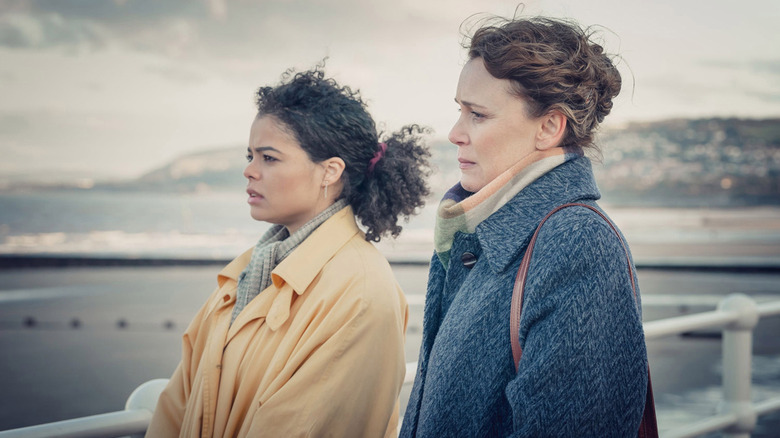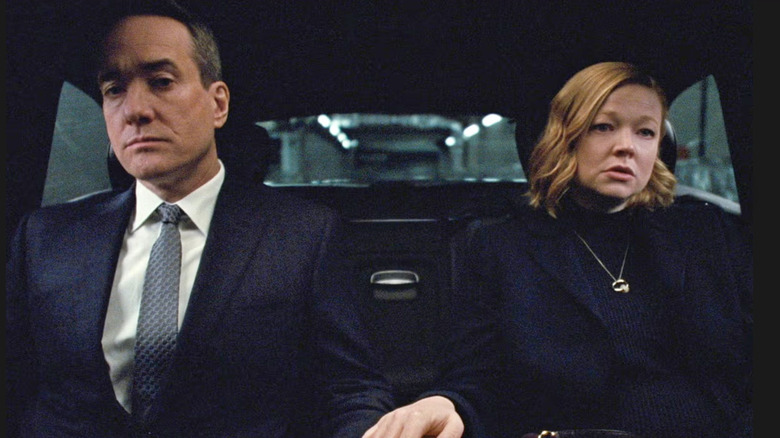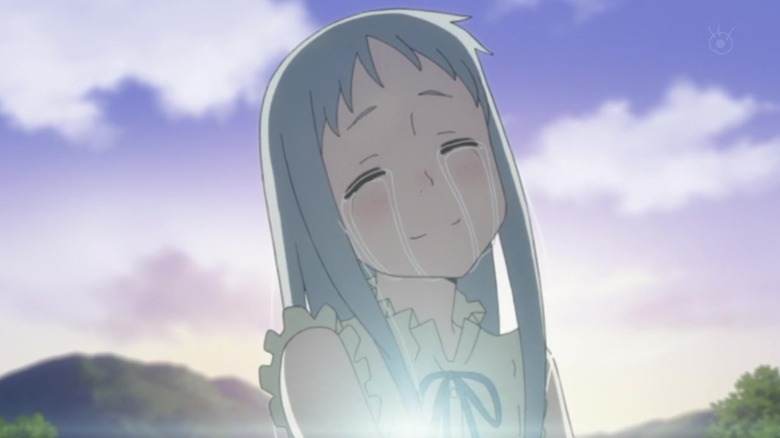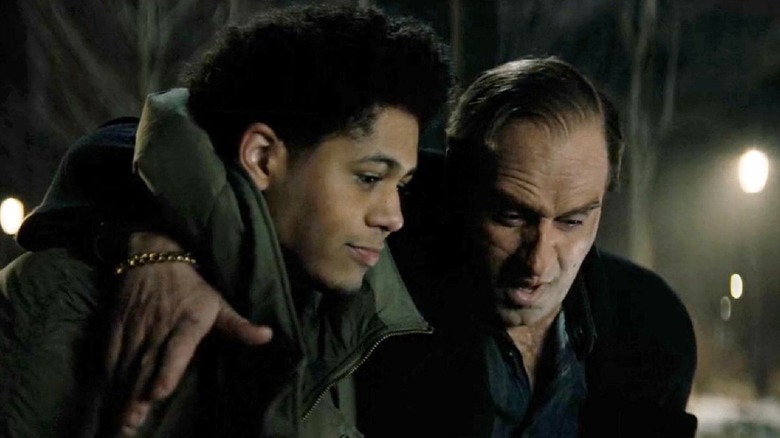The Saddest Endings In TV History
If you love a TV show enough to make it to the finale, you're probably going to be bummed when it's over. That's pretty much true whether the ending of the show itself is sad or not. But there are some shows that decide to go beyond such default sadness. These series decide a dark and dour finale is the best way to authentically reward their fans for sticking it out until the end.
There's something uniquely devastating about a downbeat TV finale. TV shows allow their fans to get to know a group of characters over a long period of time — years, in many cases. When the final moments we share with those fictional pals are depressing ones, it hits like a truck. But that doesn't make these finales bad: In their sadness, they might brilliantly redefine what we thought we were watching, or reaffirm that the show's creative vision. We're here to take a look at those TV endings that leave us in tears, from "M*A*S*H" to "BoJack Horseman."
The Wire
"The Wire" is not a happy series. Its story centers around the city of Baltimore, and all the ways its systems fail the people who live there. Over the course of five seasons, the show introduces us to a complicated world of drug dealers, addicts, cops, reporters, teachers, and dock workers who are all trying their best to make their way through a world disinclined to help them.
In the show's final episode, "The Wire" refuses to suggest the beginning of a hopeful new chapter. Instead, it implies old, broken patterns will continue on into the future. Children who were introduced to the show in Season 4 make the same mistakes we've seen characters make since the show's first episode. The cops who are working to take down drug lords find that new ones spring up in their place. The violence and crime that are defining features of the series continues unabated.
The ending of "The Wire" might not make you cry, but it'll certainly make you depressed. It suggests that the world is fundamentally unchangeable, and that the suffering in Baltimore will continue until a miracle happens.
Chuck
"Chuck" is not what most people would call a dark show. Over the course of its five-season run, it mostly tells stories about Chuck Bartowski (Zachary Levi), a normal nerd who slowly transforms into a super spy. In its final episodes, though, the show pulls the rug out from under its audience. Sarah (Yvonne Strahovski), Chuck's wife and partner in spycraft, is kidnapped and has her memory wiped. She doesn't remember her love for Chuck, or the relationship that exists between them.
Instead of riding off into the sunset, "Chuck" uses its final hours to revert Sarah back to the cold, emotionally distant person she was when Chuck first met her. The show ends with a kiss between Chuck and Sarah, a sign that their romance might survive in spite of the memories she's lost, but it's a decidedly ambiguous moment. The series finale further features several heartbreaking moments in which the people who populate Sarah's life try to bring back the person she's grown into.
Ultimately, "Chuck" forces the viewer to take it on faith that Sarah and Chuck will be okay, even though all it leaves them are the tatters of the love they once shared.
Fleabag
The second and final season of "Fleabag" proudly announces in its first episode that it's "a love story." By the end of the season, though, you realize that it's not necessarily a love story with a happy ending. The season's thrust is our titular character (Phoebe Waller-Bridge) falling in love with a priest (Andrew Scott), who ultimately decides to remain devoted to God. In the final scene, he visits her at a bus stop, and she tells him that she loves him.
His reply is devastating: "It'll pass." She doesn't get to be with him, even though he admits he loves her as well. It's a terribly sad ending, even if we realize by the end that Fleabag will probably be okay. In a gesture that suggests the finality of the ending, she walks away from the camera that's been following her this entire time. She no longer needs to share her life with us, and we, as an audience, need to be okay with that.
If you find yourself quietly devastated by the heartbreak in the final episode of "Fleabag," the show offers you this reminder: It'll pass.
Six Feet Under
The final moments of "Six Feet Under" were designed in a lab to completely devastate everyone who loves the show. As Claire (Lauren Ambrose), the baby of the Fisher family, drives away from the life she's known, we're treated to a montage in which every character we've come to love over the course of the series meets their maker.
It's a perfect summation of death's inevitability, and its beauty. The show suggests that each of its main characters go on to lead meaningful lives, and then, at some point, pass away, as all people must. It doesn't treat death as a cudgel, or as something that only exists to get an emotional reaction out of viewers. Instead, "Six Feet Under" presents death as what it is: A natural part of being alive. Everything is temporary, and in the ending of "Six Feet Under," the show provides a gut-wrenching reminder to hold on to what you've got while you've got it.
Dinosaurs
Of all the shows on this list, "Dinosaurs" may seem like the most unlikely to make you weep. This unique series, which tells the story of a family of dinosaurs who are thriving in a world run by their species, chooses to lean into darkness in its finale, leading to an ending that could be one of the bleakest on this list.
As it turns out, the dinosaurs have become so wrapped up in a desire for profit that they inadvertently kill themselves off. The show suggests that it's the dinosaurs themselves who bring on the ice age, and therefore create their own extinction event. It's an anti-capitalist screed about what it means to put profits over people, which feels hugely prescient in an era where climate change looms over every decision humans make.
"Dinosaurs" has the cojones to kill off its entire cast, and the rest of the dinosaur race. Even shows about the end of the world don't usually feature endings that are that bleak. In killing off its beloved stars, though, the show makes a valuable point about where the humans watching the show are eventually headed.
Chernobyl
Although it's only five episodes long, "Chernobyl" nevertheless leaves a huge impact of viewers. The series tells the story, much of it previously untold, of the Chernobyl disaster, with particular focus on the bureaucracy that proved so ineffectual in dealing with the crisis.
In its final episode, the series depicts the U.S.S.R.'s half-hearted effort to hold people accountable. Ultimately, a few low-level men inside the facility are held responsible, while the entire system that they exist within is ignored. The lies told about the Chernobyl facility, and the conditions that allowed the facility to be as unsafe as it was, are not reckoned with.
Thus, Valery Legasov (Jared Harris), the crusader who wants to change how the U.S.S.R. handles its nuclear facilities and the hero of the series, kills himself. He knows, fundamentally, that the change he longs for will not come: People are much happier living with the lie. And that, quite simply, is a truth he cannot live with himself.
Blackadder
Although each series of "Blackadder" is set in a different era, the show's overall tone remains relatively constant. The show's final season, "Blackadder Goes Forth," places the show's antihero and several other familiar faces in World War I. Because it's a comedy, it's easy to assume that "Blackadder" is going to trivialize the grim nature of the war it's depicting.
In fact, the show takes the opposite approach. In its final episode, Blackadder (Rowan Atkinson) and the rest of the show's central characters realize that they are about to be sent on a mission of no return. They spend much of the episode attempting to escape from their fate. In the show's final moments, though, they hop out of the trench and are presumably gunned down in a blaze of gunfire. Few shows are bold enough to kill off their entire main cast in their finale, but that's precisely what "Blackadder" does.
The finale was widely acclaimed after it aired, not just for its boldness, but also for the ruthlessness with which it is able to depict the horrors of war. Soldiers are sent to their deaths every day, and "Blackadder" is one of the few shows willing to depict that reality in full.
Twin Peaks
The final moments of "Twin Peaks" are the opposite of uplifting. Disregarding 2017's "Twin Peaks: The Return," which functions more as a sequel than as a continuation of the original series, the 1991 Season 2 finale of "Twin Peaks" depicts things in a pretty dire state. Initially, we think that Dale Cooper (Kyle MacLachlan) has managed to enter the Black Lodge, rescue Annie Blackburn (Heather Graham), and return to the town of Twin Peaks unharmed.
In the show's final moments, though, we see that Dale Cooper is no longer the stand-up FBI agent we met at the beginning of the series. He's been corrupted by BOB, the evil presence at the heart of the town who is responsible for the death of Laura Palmer. In the final moments of its original run, "Twin Peaks" pulls the rug out from under its audience, changing TV with no one noticing. You believe you're watching a happy ending, only to discover that the stalwart hero is utterly absent. In his place is a vision of pure evil.
Veep
The ending of "Veep" is not sad in the sense of being likely to make you cry. Rather, the show devotes its final episode to the emptiness of politics. As Selina (Julia Louis-Dreyfus) attempts to win her party's nomination for president, she reveals that she's willing to sacrifice everyone and everything she's supposed to care about. She trades away her principles to earn support from other wings of her party, and blames Gary (Tony Hale), the person who has been at her side throughout the entirety of the show, for an FBI investigation into her charity fund.
Selina betrays everyone, and a result, she gets what she wants. Ultimately, though, viewers know that her victory is a hollow one, because it comes at the cost of every character they've grown to love. From its first episode, "Veep" presents a world where what you pass as an influential politician matters less than how much power you accumulate. In its final episode, "Veep" doubles down on that brutal theme and digs into the dark heart of what makes the American political system so absurd. Viewers able to sit through the unsettling finale are left with a gnawing pit in their stomach.
The Good Place
How do you end a show when your principal characters have been dead the whole time? As it turns out, the answer to that question is to kill them again. In the final episode of "The Good Place," we see that all four core members of the show's human cast have all finally arrived in the good place. Once there, they fulfill every desire they've ever had. Eventually, though, they realize that they're ready to move on, and essentially phase out of existence.
It's a concept that's almost too heady for TV, but Chidi (William Jackson Harper), ever the professor, explains it well. The core cast of "The Good Place" are like a wave: Once they crash on the shore, they disappear, but the beads of water they left behind are still there.
"The Good Place" finale is about accepting the end of your own existence. Specifically, it's about willingly relinquishing your identity and becoming a positive force in the universe. Death isn't the end for the show's main characters, but in the final episode, they all blink out of existence for good, in a way that goes far beyond the mere stopping point that is physical death. The show suggests that they've all accepted this choice, but that doesn't mean the audience isn't sad about it.
Deadwood
Although the final episode of "Deadwood" wasn't intended to be that at the time, its ending feels in line with the themes that the show plays with throughout its run. The show's third season follows the showdown between George Hearst (Gerald McRaney) and Al Swearengen (Ian McShane), but by the time the finale gets underway, it's clear that Hearst has already won. His brutal, capitalistic ways are the future, and Al and Sheriff Seth Bullock (Timothy Olyphant) will soon be relics of the past.
In the final episode, Hearst extracts one final sacrifice from the town's citizens. Al is asked to kill Trixie (Paula Malcomson), and decides to kill another woman in her stead. It's not a situation he's happy about, but it's one he knows he has to live with to avoid greater ruin. Death has come to Deadwood, and there's nothing anyone can do to stop it. The episode is called "Tell Him Something Pretty:" A fitting title, and a firm reminder that pretty words don't make up for the heinous deeds of powerful men.
Parenthood
The ending of "Parenthood" is dark in a uniquely simple way: It focuses on the death of the Braverman family's patriarch, Zeek (Craig T. Nelson). The show's final moments take place after Zeek's death, as we see the rest of the Bravermans assemble to play baseball in his honor.
It's a beautiful, moving tribute that acts as a reminder of the legacy that Zeek has left behind. He created the family at the center of the series, and in its final moments, the show chooses to spotlight that. Zeek's death is a sad event, but "Parenthood" reminds us that feeling sad is just one part of the human experience. Losing Zeek feels like losing a member of your family should: It breaks your heart, but it also gives you a chance to remember all the great things the person did while they were alive. It's bittersweet, contemplative, and utterly honest.
M*A*S*H
After 11 seasons on the air, no one expected "M*A*S*H" to do anything all that daring in its final episode. The series finale chronicles the end of the Korean War, and the party that the members of the camp throw before they say their tear-filled goodbyes to one another. Before those farewells happen, though, we get a meaty plot about the weight of the conflict, and what it's done to Hawkeye Pierce (Alan Alda), the show's main character.
In this episode, Hawkeye revisits a traumatic incident that occured as his unit was returning from a beach outing. Their bus eventually picked up a number of refugees, but was forced to pull off the road in order to avoid being spotted. Hawkeye specifically recalls telling a woman to quiet her chicken, and the woman killing the chicken to keep it from making noise.
Later on in the episode, we learn that Hawkeye has repressed the real memory: It wasn't a chicken she was trying to keep silent, but her own baby. The woman smothered her baby in order to survive, and Hawkeye can't cope with the reality of that memory. It's a dark, dark turn for the final episode of the show, but one that feels necessary. Even though "M*A*S*H" was ostensibly a comedy, it never shied away from depicting the brutal realities of war.
Merlin
The series finale of "Merlin" plays like a brutal tragedy. From the very beginning, the show is centered around the friendship between Arthur (Bradley James) and Merlin (Colin Morgan). As we watch Arthur ascend the throne and adventure with the rest of the knights of the round table, that doesn't change. In the final episode, though, Arthur is struck down, and Merlin is unable to revive him. He's told that Arthur will rise again, but neither Merlin nor the audience gets to see that happen.
Instead, we see that Merlin spends millennia waiting for his friend to come again. He's an ageless, eternal being, doomed to be traumatized by a past that he has no power to change. While the rest of the characters in "Merlin" get to live complete arcs, the show's central figure must remain in stasis. The life he leads now is one comprised entirely of waiting. He's lost his best friend, and now, all he can do is pray that someday, he'll get to see him again.
The Shield
Nobody gets what they want at the end of "The Shield," and perhaps that's how it should be. In the show's final episode, we see the sins of its pilot finally paid off. The incident that kicks off the show is the murder of a police officer by two fellow officers: Vic Mackey (Michael Chiklis) and Shane Vendrell (Walton Goggins). In the finale, Shane and Vic are both forced to pay for this crime, at long last.
Shane's punishment may seem more obviously severe, as he kills himself and the rest of his family as the police close in around him. His death is indeed the tragedy at the center of the episode, but Vic's punishment is an entirely different kind of hell. He's taken off his special police force and relegated to a desk job for the rest of his life.
Gone is his freedom to haggle with drug brokers and abuse low-level gang members. Now, Vic has to do the boring, necessary parts of police work — and he's going to hate every second of it. He gets what's coming to him, but that doesn't make the ending of "The Shield" any less depressing.
How I Met Your Mother
The ending of "How I Met Your Mother" was hugely anticipated. That excitement stemmed in part from the show's premise, which suggests that eventually, Ted (Josh Radnor) will get to the part of the story that involves his wife. We see their first interaction in the finale, and then get an abbreviated look at what his life with his kids' mother, Tracy (Cristin Milioti), went on to be like. It's just as sweet and romantic as fans hoped for.
The episode ultimately reveals, though, that Tracy dies in 2024. She and Ted build a life together, but it isn't meant to last forever. Although Milioti only plays a prominent role in the final arc of the show's run, she made such an enormous impression on audiences that her death proved to be a deeply sad and divisive event. The entire show builds up to the mother's arrival, and when audiences finally meet her, she doesn't disappoint — but the show's decisions do.
The final episode of "How I Met Your Mother" became more controversial for suggesting that, after Tracy's death, Ted ultimately falls back in love with Robin. To many, this choice rings hollow, in part because of all the hype that had been built around the mother. Even so, her death still leaves many fans reaching for a tissue.
The Americans
If you present a simple and factual account of what happens at the end of "The Americans," it might not seem too bad. Philip (Matthew Rhys) and Elizabeth (Keri Russell), the Russian spies at the center of the show, manage to safely return to the U.S.S.R. after spending years living as Americans. in order to make their escape, though, they have to give up the entire life they've built in the U.S. Their daughter Paige (Holly Taylor), who was supposed to join them on their journey to the Soviet Union, decides to stay behind, and it's unclear whether they'll ever see her again.
When you dig into the emotions of the finale, its true tragedy is revealed. Philip has to tell his best friend that he's been lying to him for years, and entrust him with looking after the son they're leaving behind. What's more, the society they're returning to is on the brink of collapse. All of the crimes and all of the lying that the two of them have been doing for the sake of their homeland will be for naught. They built their lives in the U.S., are forced to abandon those lives for a country they haven't lived in for years, and then ... that country, crumbling from the inside, makes it very clear that it doesn't care about them at all. It's a crushing final blow.
The Leftovers
The final episode of "The Leftovers" has a happy ending, but it's one that comes after an enormous amount of trauma. The episode is set more than a decade in the future, as Nora (Carrie Coon) lives a quiet, remote life in Australia. That life faces a huge disruption when Kevin (Justin Theroux), her former boyfriend and the love of her life, shows up out of the blue. The entire episode is built on the weight of the history between these two characters, and that history is grueling.
When they finally reconcile, it's a moment of enormous relief, and a reminder of how far they've both come. "The Leftovers" is set in a world where 2% of the world's population inexplicably vanishes, and the show's finale does not provide any firm answers. Instead, it suggests that what matters is how its characters feel, and whether or not they've been able to overcome what they've been through.
Kevin and Nora have struggled before, but the finale suggests that maybe, just maybe, there might be reason for hope. It's an optimistic ending, but one that serves to highlight the deep sadness that the two of them have shared throughout the series.
BoJack Horseman
The final episode of "BoJack Horseman" opens with the titular character (voiced by Will Arnett) being rescued from the pool at his former house. He winds up in prison for trespassing, and finds that the routine his life takes on in jail is good for his battle with addiction. The finale then leaps forward one year. BoJack is released for Princess Carolyn's (Amy Sedaris) wedding, where he sees all of his friends. It becomes increasingly clear, however, that these friendships, which have been the core of the series, may not last forever.
BoJack is a better person than he was when the show started, but he's done irreparable harm to the people he's supposed to care about most. They still love BoJack, but they know that if they're looking to build healthy lives for themselves, they might have to leave him behind. As Diane (Alison Brie), BoJack's closest confidant, tells him, some people are meant to be in your life to help you grow, but that doesn't mean they'll stay in it forever.
The finale of "BoJack Horseman" is about knowing when relationships have run their course, and allowing people to leave your life, even if it hurts in the moment.
When They See Us
"When They See Us" has an ending that could be described as happy. The Central Park Five, who have spent years in prison, are eventually exonerated for the crime of raping a woman, and the real criminal is brought to justice. In the end, then, their story is one of triumph. However, that triumph comes at an enormous cost. The young kids we follow throughout the series have been brutalized by a system that was built to automatically assume the worst of young Black men like them.
These characters have been traumatized, and the fact that they are eventually exonerated does not erase what has happened to them. "When They See Us" sheds a light on the crime that was perpetrated against these boys, and what it reveals is devastating. They could not defend themselves, so they were swallowed up by a vicious establishment. The fact that they're spit out again is cold comfort.
It's a Sin
A TV show about the AIDS crisis was never going to be a great time, but "It's a Sin" is a horrifying reminder of what the early days of AIDS were truly like in the U.K. The show follows a group of young, gay Londoners who are thrilled to be able to live their lives as who they really are. Slowly, though, we begin to see the AIDS crisis invade and transform those lives, and the world around them.
By the end of the show, several of the main characters have died. The show's final moments are rooted in the show's hero, Ritchie (Olly Alexander), succumbing to the virus. He was once vibrant, cocky, and full of life ... and he dies alone in his childhood bedroom, cut off from the friends who love him so dearly. "It's a Sin" is about what it meant to be gay during this era, and how AIDS redefined an entire generation of people. It's also about a few particular young men whose lives are cut tragically short. The finale brings this sadness into sharp and unforgettable focus.
Succession
After four seasons of power plays between characters viewers loved to hate, the "Succession" series finale "With Open Eyes" finally reveals which of the Roy siblings would win control of their father's company, and the answer is ... none of them. Kendall (Jeremy Strong) almost gets Shiv (Sarah Snook) and Roman (Kieran Culkin) to agree to block the Waystar-GoJo merger and vote him in as the new CEO, but Shiv changes her mind at the last minute, telling her brother, "I just don't think you'd be good at it."
Nobody comes out of the finale in a good place. Tom (Matthew Macfadyen) ends up CEO of the new merged company, but knowing he's nothing more than a puppet for Matsson. Shiv is stuck as Tom's trophy wife in a loveless marriage. Roman is arguably best off out of the main cast, having made peace with being an immature loser, but he's still an immature loser. And Kendall, who'd dedicated his whole life to becoming CEO, is now without a purpose and severely depressed.
This ending isn't quite as much of a tearjerker as some of the others on this list, but it's absolutely one of the bleakest and most overall depressing. The Roy siblings might be extremely unlikable and emblematic of the worst aspects of the 1%, but having come to understand their messed-up psychologies, you can't help but feel terrible for all of them.
Anohana: The Flower We Saw That Day
The anime "Anohana: The Flower We Saw That Day" centers on the "Super Peace Busters," a group of friends who drifted apart in 5th grade when one of them, Menma (Ai Kayano), died in an accident. Five years later, Menma starts appearing to her now-reclusive friend Jintan (Miyu Irino) as a ghost, encouraging him to get the band back together and help fulfill her final wish so she can move on to the afterlife.
That's already an emotionally loaded set-up, so it shouldn't come as too much of a surprise that the series finale, "The Flower Blooming on That Summer," is one of the saddest anime episodes ever. Really, the whole episode is just the longest tear-filled goodbye, with Menma writing final messages for all her friends (and finally appearing to all of them) before she disappears. Oh, and that final wish she was trying to fulfill? It was to help Jintan feel okay about crying.
As farewells to childhood memories go, this finale is up there with the ending of "Toy Story 3" in terms of weapons-grade tearjerker fuel. It's impossible to watch with dry eyes.
The Penguin
"A Great or Little Thing" might not remain the finale of "The Penguin," since executive producer Matt Reeves has said a second season is potentially on the table. However, if we're viewing "The Penguin" as the one-off miniseries it was originally announced as, its conclusion is one of the most devastating in recent memory.
Much of the tension throughout this comic-inspired crime drama comes from how viewers are meant to feel about Oz (Colin Farrell). At points, his personable charisma makes you want to root for him, but there's a monstrous, sociopathic side to the rising kingpin as well. Oz's final interactions with his protege Vic (Rhenzy Feliz) showcase both the human and malevolent sides of the villainous protagonist — and the dark side wins out.
"You're family to me," Vic tells Oz ... but having been disowned by his now-vegetative mother (Deirdre O'Connell), Oz now sees family as a weakness, and that's why he strangles Vic to death. Oz recognizes his human feelings and actively rejects them in the most horrific way possible. Imagine if "Breaking Bad" ended with Walt killing Jesse rather than saving him. That's the level of gut-punch this moment feels like. The episode's closing scene, where Oz hires Eve (Carmen Ojogo) to pretend to be his mom complimenting him, just further emphasizes how tragically messed-up Oz's relationships are with anyone he's ever cared about.
